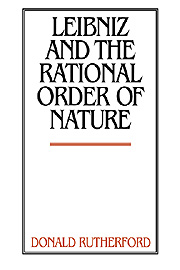Book contents
- Frontmatter
- Contents
- Acknowledgments
- A Note on Citations and Translations
- Abbreviations
- Introduction
- Part I Theodicy
- 1 The Vindication of Divine Justice
- 2 The Maximization of Perfection and Harmony
- 3 Happiness and Virtue in the Best of All Possible Worlds
- Part II First Philosophy
- Part III Nature
- Conclusion
- Bibliography
- Index
1 - The Vindication of Divine Justice
Published online by Cambridge University Press: 05 June 2012
- Frontmatter
- Contents
- Acknowledgments
- A Note on Citations and Translations
- Abbreviations
- Introduction
- Part I Theodicy
- 1 The Vindication of Divine Justice
- 2 The Maximization of Perfection and Harmony
- 3 Happiness and Virtue in the Best of All Possible Worlds
- Part II First Philosophy
- Part III Nature
- Conclusion
- Bibliography
- Index
Summary
Leibniz's doctrine of theodicy is a modern response to an ancient problem: how to reconcile the existence of evil – particularly undeserved human suffering – with the assumption that the world has been created by a God who is both infinitely powerful and infinitely just. As Epicurus suggests in his classic formulation of the problem, the manifest presence of evil in the world appears to imply that any divine creator must be either lacking in power or lacking in goodness:
God either wishes to take away evils and is unable; or he is able, and is unwilling; or he is neither willing nor able; or he is both willing and able. If he is willing and unable, he is feeble, which does not agree with the character of God; if he is able and unwilling, he is malicious, which is equally at odds with God; if he is neither willing nor able, he is both malicious and feeble and therefore not God; if he is both willing and able, which is alone suitable to God, from what source then come evils? or why does he not remove them?
Early in his philosophical career, Leibniz arrived at an answer to Epicurus's question that would remain an important part of his thinking until his death. As a supremely perfect being, he reasons, God is naturally disposed to create the possible world of greatest perfection. Nevertheless, however great its merits, a created being cannot possess the absolute perfection of God.
- Type
- Chapter
- Information
- Leibniz and the Rational Order of Nature , pp. 7 - 21Publisher: Cambridge University PressPrint publication year: 1995



